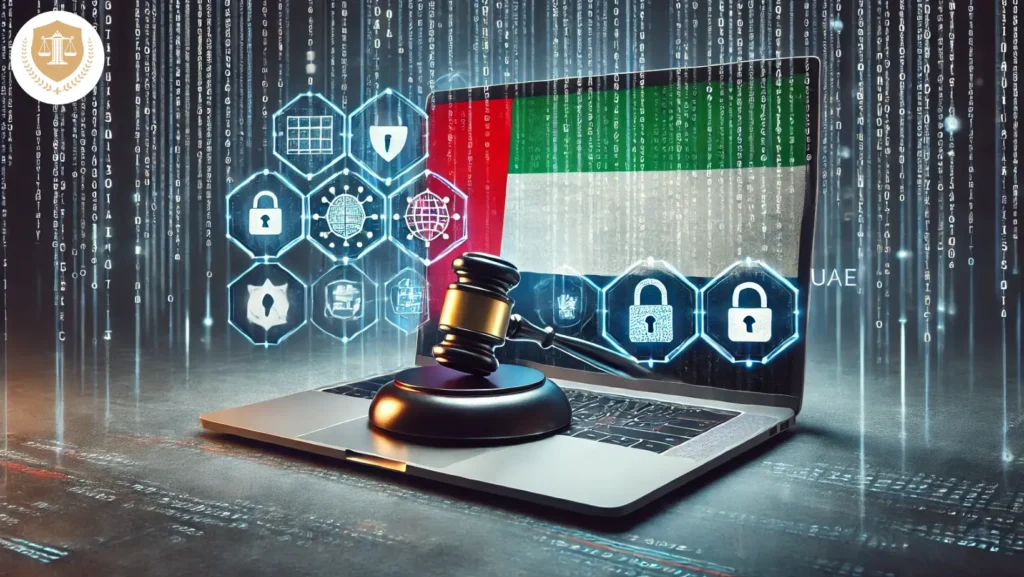In today’s digital world, cybercrime law uae is a growing concern, and the UAE has some of the strictest cybercrime laws to ensure online safety. Whether you’re a resident, a business owner, or a visitor, understanding these laws is essential to avoid legal trouble. From hacking and online fraud to social media violations and VPN restrictions, the UAE enforces strict penalties for cyber offenses. This guide will help you navigate UAE cyber laws, understand your rights, and learn how to stay safe online. Let’s dive into what you need to know about cybercrime law in the UAE.
Quick Answer
cybercrime law uae: Strict laws under Decree-Law No. 34 of 2021 impose fines up to AED 3M and jail for offenses like hacking, fraud, and VPN misuse.
Common Cybercrime Offenses in the UAE

The UAE has strict laws against various cybercrimes, including online fraud, hacking, identity theft, and financial scams. Posting false information, defaming someone online, or spreading rumors can lead to heavy fines or jail time. Unauthorized use of VPNs to access restricted content is also illegal. Social media misuse, including cyberbullying and offensive content, is strictly monitored. Understanding these cybercrime offenses in the UAE is important to stay safe online and avoid unintentional legal violations. Always follow UAE internet laws to protect yourself.
How Does the UAE Handle Cross-Border Cybercrimes?
With the rise of international cyber threats, the UAE collaborates with global law enforcement agencies to track and prosecute cybercriminals operating across borders. The country is part of Interpol’s Cybercrime Directorate and works with organizations like Europol to combat online fraud, hacking, and digital terrorism. UAE authorities can extradite offenders under international treaties, ensuring that cybercriminals cannot escape justice. Businesses and individuals should be aware that cyber offenses committed from abroad but targeting UAE residents can still be prosecuted under local laws.
Also read: UAE Visa Amnesty Extension Are You Eligible for Relief?
Legal Consequences: What Happens If You Violate UAE Cybercrime Laws?
Violating UAE cybercrime laws can lead to serious penalties, including fines, imprisonment, and deportation for expats. Online fraud, hacking, and spreading false information can result in fines reaching millions of dirhams. Cyber defamation and social media misuse can also lead to legal action. Even using a VPN for illegal activities is punishable. UAE authorities take cyber offenses seriously, so staying informed about UAE internet laws is crucial to avoid trouble and ensure safe online behavior.
How to Report Cybercrime in the UAE
| Cybercrime Offense | Description | Penalty | Legal Reference |
|---|
| Hacking and Unauthorized Access | Gaining access to networks, emails, or devices without permission. | Fines up to AED 3 million and/or prison | UAE Cybercrime Law (Federal Decree-Law No. 34 of 2021) |
| Online Fraud & Identity Theft | Using digital platforms to deceive individuals or steal personal data. | Fines up to AED 1 million and jail time | UAE Penal Code & Cybercrime Law |
| Defamation & Cyber Harassment | Publishing false or offensive content about someone online. | Fines up to AED 500,000 and/or imprisonment | Federal Decree No. 5 of 2012 |
| Spreading Fake News & Rumors | Posting false information that harms national security or public order. | Fines up to AED 3 million and prison | UAE Media and Cybercrime Laws |
| Illegal Use of VPNs | Using VPNs to bypass restrictions or commit cyber offenses. | Fines up to AED 2 million and/or jail time | UAE Cybersecurity Regulations |
| Phishing & Email Scams | Sending fraudulent messages to steal sensitive information. | Fines and imprisonment based on severity | UAE Telecom and Cybercrime Laws |
| Cyber Terrorism | Using digital platforms to promote or fund terrorist activities. | Life imprisonment and heavy fines | UAE Anti-Terrorism Law |
If you are a victim of cybercrime in the UAE, report it immediately to the authorities. You can file a complaint through the Dubai Police eCrime platform, visit a local police station, or call the UAE Cybercrime Unit. The government provides hotlines and online portals for reporting online fraud, hacking, identity theft, and cyber harassment. Quick action helps prevent further harm and ensures justice. Always keep evidence, such as screenshots or emails, to support your case.
How Does the UAE Educate the Public About Cybercrime Prevention?
The UAE government actively raises awareness about cybercrime prevention through campaigns, workshops, and school programs. Initiatives like “Stay Safe Online” by the Telecommunications and Digital Government Regulatory Authority (TDRA) educate citizens on phishing scams, password security, and social media safety. Universities and workplaces also conduct cybersecurity training to help people recognize and avoid cyber threats. These efforts aim to build a digitally responsible society that is well-informed about online safety practices.
What Role Does AI Play in Enforcing Cybercrime Laws in the UAE?
Artificial Intelligence (AI) is becoming a key tool in the UAE’s fight against cybercrime. Government agencies use AI-powered surveillance, automated threat detection, and predictive analytics to identify and prevent cyberattacks. AI-driven chatbots also assist victims in reporting cybercrimes more efficiently. The UAE’s Cybersecurity Council is investing in machine learning algorithms to track cyber threats in real time. As AI technology advances, it will play an even bigger role in digital security and law enforcement.
Can Businesses Be Held Liable for Cybercrime in the UAE?

Yes, businesses operating in the UAE must comply with strict cybersecurity regulations, and failure to protect customer data can result in legal liability. Companies can face fines or operational restrictions if they fail to implement proper data security measures. The UAE’s Personal Data Protection Law (PDPL) requires businesses to secure digital transactions and prevent breaches. Employers are also responsible for educating employees about cybersecurity risks to avoid internal cyber threats.
Tips to Stay Safe Online in the UAE
To avoid cybercrime in the UAE, follow safe online practices. Use strong passwords and enable two-factor authentication to protect your accounts. Avoid sharing personal details on social media and be cautious of phishing emails or online scams. Do not use VPNs for illegal activities, as it can lead to legal trouble. Always verify websites before making online payments. Staying aware of UAE cyber laws and practicing digital security will help keep you safe from cyber threats.
FAQs on Cybercrime Law in the UAE
What are the penalties for cybercrime in the UAE?
Penalties vary depending on the offense but can include heavy fines (up to millions of dirhams), imprisonment, and deportation for expats. Serious crimes like hacking and online fraud carry strict punishments.
Is using a VPN illegal in the UAE?
Using a VPN for legal activities is allowed, but using it to bypass restrictions or commit cybercrimes can lead to fines and legal action.
How can I report cybercrime in the UAE?
You can report cybercrimes through the Dubai Police eCrime platform, local police stations, or cybercrime hotlines. Keeping evidence is important when filing a complaint.
Can social media posts lead to cybercrime charges in the UAE?
Yes. Posting defamatory content, spreading false news, or sharing offensive material can result in fines, jail time, or deportation.
How can I protect myself from cybercrime in the UAE?
Use strong passwords, enable two-factor authentication, avoid suspicious links, and stay informed about UAE cyber laws to ensure online safety.
Final Thoughts on Cybercrime Law UAE
The UAE takes cybersecurity seriously, enforcing strict cybercrime laws to protect individuals and businesses. Understanding these regulations helps you stay safe online and avoid legal issues. Whether it’s online fraud, hacking, or social media misuse, penalties can be severe. Always follow UAE internet laws, report cybercrimes when necessary, and practice digital safety. By staying informed and cautious, you can enjoy a secure online experience while complying with the country’s strict cybercrime regulations.

